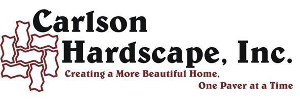When looking to transform or add to you outdoor living areas such as driveways, patios, and sidewalks, one has many options to select from. Each has different advantages and disadvantages. Here are some of the advantages and disadvantages of pavers:
Durability
Pavers are far more durable than concrete. Pavers are made to a higher density specification than typical poured concrete. Typical pavers are made to a density of at least 8000 psi compared to typical concrete which is around 3000-6000 psi.
Life Expectancy
A typical life expectancy of a concrete paver is over 30 years compared to about 10 years for concrete or asphalt.
Flexibility
Pavers are a flexible pavement system. This allows the pavers to move, making them more resistant to damage due to the freezing and thawing cycles found in the Midwest.
Repairable
If settling or damage occurs, pavers can easily be taken up and the area fixed. The other advantage of pavers is the ability to add on in the future without leaving a noticeable difference between the old and new.
Design
When going with pavers, design options are unlimited. With multiple manufactures serving the Midwest one has many types of pavers, colors, textures, and patterns to choose from.
Cost
Standard concrete is typically lower in cost compared to pavers but when compared to stamped concrete the price difference is very little.
